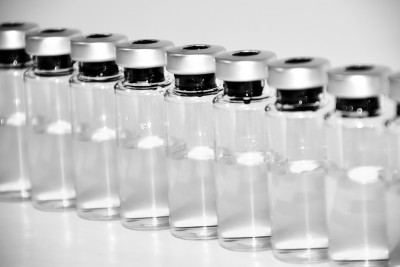Vaccine Handling and Storage, by Bob LeValley
Amy Barkley, Livestock Specialist
Southwest New York Dairy, Livestock and Field Crops Program

Vaccine Handling and Storage
Bob LeValley, Oklahoma Beef Quality Assurance Coordinator
The highest quality vaccine that producers purchase may be of little value if not handled and stored properly. Even experienced producers may overlook key principles when preparing and administering vaccines and other animal health products. Product storage and handling is important to ensure that the efficacy of the products is not compromised.
Modified live vaccines must be reconstituted with a sterile diluent prior to administration. It is generally recommended that these products be used within an hour of reconstitution. The products are routinely used with a good response when administered and handled according to label directions. The processing speed in a stocker operation is often considerably faster than a cow/calf operation. Cow/calf processing facilities are often in area that are not well sheltered from the weather. This stresses the need to exercise caution when handling and administering modified live products. Common handling techniques can render MLV products ineffective and even reduce the effectiveness of killed vaccines and other products.
It is always a good practice to purchase vaccines from a reputable distributor. A vaccine will have less than normal effectiveness if it has ever been stored improperly. Improper storage includes freezing, and/or exposure to heat or sunlight. Maintaining a high level of efficacy is critical to establishing immunity in a majority of vaccinated cattle. Vaccines should be stored in a dependable refrigerator that maintains a temperature (typically 35-45⁰ F) as directed by the product label. Chute side vaccine coolers work well for holding the vaccines during processing. These coolers have slots for holding syringes after they are loaded, and vaccines are placed inside the cooler to maintain temperature. Vaccine coolers can be purchased ready to put to use, or can easily be constructed by converting small coolers to this intended purpose. Instructions for constructing an inexpensive vaccine cooler are available by clicking the "Chute Side Vaccine Cooler" link on the beefextension.okstate.edu website.
It is also important to maintain a record of lot/serial numbers of products in the event of a recall or other situations that may arise. A quick and easy method of recording the lot and serial numbers while working cattle is to simply to take a photo of the information on the vial label with a cell phone camera. It can be transferred later to more permanent records. Products that are out of date should be properly discarded. Through proper record keeping, storage and handling, animal health products will be an effective piece of a comprehensive cattle health program.
Dr. John Gilliam, Clinical Associate Professor for Food Animal with the College of Veterinary Medicine at Oklahoma State University, discusses herd heath and vaccination. This webinar is part of the Thursday Rancher's Series and was presented on Sept. 17, 2020. OSU Extension: Herd Health and Vaccinations - YouTube
Upcoming Events
WEBINAR - Automated Milking Systems Efficiency: Balancing Focus on Individual Cows and System Optimization
May 8, 2024
Please join Cornell the SWNY team and MSU Extension for our talk with Dr. Pablo Silva Boloña on improving efficiency of Automated milking systems by focusing on milking settings for individual and group success.
Broiler Field Day at Sunny Cove Farm
June 6, 2024
Alfred Station, NY
Join us for a field day to explore broiler production, processing, and finances. Meghan Snyder of Sunny Cove Farm will be our host. She raises small batches of organic broilers, processing them on-farm under the 1,000 bird exemption.
Stockmanship and Stewardship 2024
October 25, 2024
Hamburg, NY
Save the date!! The event is one of 4 across the US and is a two-day educational experience featuring low-stress cattle handling demonstrations, Beef Quality Assurance educational sessions, facility design sessions, and industry updates.
Announcements
No announcements at this time.





